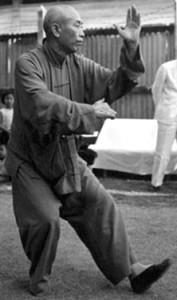
Tung Ying Chieh (1898-1961) was a well known master of the traditional Yang style of Tai Chi Chuan. He was a top student of the famous 3rd generation Yang Family Tai Chi Chuan master Yang Cheng Fu (1883–1936). Tung Ying Chieh trained with Yang Cheng Fu for more than 17 years, and assisted with Yang with teaching when he went on travels through China.
Tung Ying Chieh wrote this essay on important points of the practice of Tai Chi Chuan. Although Tung was a master of the Yang style and the Wu/Hao styles of Tai Chi Chuan, this work is valuable to all students of Tai Chi Chuan no matter the style which they might practice.
This is one of several essays which Tung Ying Chieh wrote and included in his “Red Book”, on Tai Chi Chuan called “Tai Chi Chuan Explained”
Below is an excerpt from the book on the section called “Words of Experience”.
- Tai Chi Chuan is an internal martial art exercise. Strength is produced in the bones. Power is reserved at the muscles. It does not require one to have tough skin or thick muscles, but sunken “chi” and strong bones are required. Therefore, learners have no suffering of broken bones and hurt muscles, and the tiredness of jumping, but just move naturally to find the potential of power of origin. It is an exercise to develop the your original power.
- The three main points: spirit, intention, and posture (likeness of the movement’s names) have to be there. If the posture is correct, then the spirit and intention are there, and you will have good progression. Also, you will feel differently every day. Learners should try to feel the differences intentionally.
- If the posture is not correct, then spirit and intention are not there. The result will be just like cooking an empty pot, even after many years of practice you will not be successful. There is a tease saying that ten years of Tai Chi Chuan practice is not as good as three years of kung fu. Therefore, for good Tai Chi Chuan practice: first you have to practice diligently; and secondly you need to have good understanding. Also, the result is dependent on your intelligence, but hard practice can help stupidity. So you should always encourage yourself to practice harder.
- Breathing during practice – to breathe naturally. Do not force your breath deeply. After many times of practice, your Tai Chi Chuan will reach the natural point. By that time, the breath will be balanced automatically.
- Originally the thirteen movements of Tai Chi Chuan are the guiding methods of « chi ». Guiding means leading the circulation of « chi » and blood. Therefore, when you do a good job of guiding, the « chi » and the blood will have a good balance. All sickness will be gone, but don’t misunderstand the method, and try very hard to obtain that balance. If you practice hard and naturally, you will get it when you reach maturity (when the time comes).
- Loosen the shoulder and drop the elbow means don’t hold the strength on the shoulders. Don’t try to make the hands heavy, but move smoothly and lightly.
- Suspend your top (of your head), and hold the bottom (anus). To suspend the top, the head has to be held naturally. If you hold the bottom, the « chi » will come up from there automatically. To withdraw the power, the breast has to be a bit vacant, but don’t hold your breast and bend your back.
- Every time when you practice the form, there are at least three things you must do. The first one is to relax your muscle. the second one is to adjust your postures. The third on is to concentrate more on intentions and spiritual styles. When you can master all the movements, then the spiritual style will appear when you move. When you reach this stage your improvement will be better and quicker.
- Feeling and understanding of power –
To learn these you have to practice more of the push hands. then you will get the benefits of stick, hold, touch, and follow. If you don’t have a partner, you can always practice the form diligently, and always use two arms to feel the power. Try to imagine that your opponent is attacking you, and the way in which you are using to control him. If you keep on practising like that for a long time, certainly you will learn the power too. - When you are doing push hands, the most important thing is to study the feeling of power, not trying to knock down your opponent. Try not to let your opponent discover your centre, and always control your opponent’s centre.
- You can practice Tai Chi Chuan while you are walking, standing, sitting and laying. The method is to use your mind to circulate the « chi », and find the feeling. For example : to feel the difference between holding a tea cup with strength, and without strength; to feel the difference of walking with heavy steps, and with light steps. When you are standing still, try to feel the difference of straightening your legs, and bending your legs; one leg, or two legs on the ground.
- During the early stages of practising Tai Chi Chuan you might experience sore muscles, but don’t worry, as this will pass and you will feel good later.
- Basic steps to learning push hands is to know the power. There are many different types of power such as: stick on power, follow on power, internal power, suspending power, rubbing power, tendering power, fastening power, holding power, touching power, and pushing power. As well there are types of power such as penetrating bone power, shaking power, crisp power, sudden power, tenth of an inch power, shooting arrow power, and even power. In general the above powers are learned from the feeling developed during practice. It is harder to learn the power by oneself, but easier with two people, as people are alive. Additionally you can use your own adjustment and feeling when you are enforcing the power. Of course, all the types of power are learned and discovered from body movements. If you have no partners, you can learn the power from the AIR.
- The principles of Tai Chi Chuan: The root is on the feet; enforce from the legs; controlled by the waist; and expressed by the fingers. These are the principles of enforcing power: never let the knees come over the toes; never stretch the hands over your nose; never raise over your eyebrows; and don’t press down below the center of the chest. All these are traditional rules. If you break these rules, then the power will not be as good. The variation is controlled by the waist. For example: If you push someone to the left with your right hand sideways, and your hand is over your nose, then the power will not be there. But if you let your left chest withdraw backward a little bit, and turn your wrist to the left a little bit, then the power is there again. So this variation is on the chest, and controlled by the waist, and finally shows on you fingers, If the whole body is relaxed and sensitive, then strong power will show on the fingers.
- People are animals, but with senses. For example: if I hit someone with my fist, the opponent certainly will use hands to block, or move his body to avoid the attack. It is the natural reaction of people, but materials are different. An example of this is a hanging sandbag. It is motionless hanging there. If you punch it, it will move forward and backward. The way it moves is on a fixed route. If you punch it to the left it will move back to the right. It is the reaction of materials. But people are different, the opponent will have various reactions for a punch. Therefore, a boxer has three words: steady, accurate, and fierce. If I don’t have these three qualities, I cannot enforce the power. If I do, then the power has to be powerful. So, how to get steady, accurate, and fierce? First, you have to have sense. So, how does one get sense? Don’t move if the opponent is not moving. If the opponent moves, you follow and finish the movement before he does. So you will have to fight for that second to finish the movement. Then you will be unbeaten.
- Before learning Tai Chi Chuan, The strength might be dull strength. After learning Tai Chi Chuan the whole body is relaxed, and with good circulation of the « chi » and blood. But you must get rid of all the nervous tension, and keep the original dull strength. Because when you are relaxed, dull strength can be turned into real power. An example of dull strength is what some people call shoulder power, as the strength is held at the shoulder, and is not controlled by the waist and shown on the fingers. Therefore, dull power is the capital. Relaxation is the Method. If you know the method, then even small capital can achieve great success. if you don’t know the method, then even with big capital you cannot be successful. That’s why if you understand the principle of Tai Chi Chuan, it will benefit you for all kinds of sports.
Translated by Albert Tang, Little Mountain Tai Club Student, thanks to Guy Tomash, courtesy taichivancouver.com

